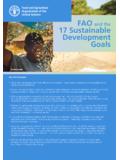Transcription of OECD Issues 2016 - Delivering Access to Justice For All ...
1 1 TABLE OF CONTENTS WHY Access TO Justice ? .. 2 Link to The Sustainable Development Goals .. 3 Links to Inclusive Growth .. 5 WHAT ARE THE BARRIERS TO ACCESSING Justice ? .. 7 HOW CAN PEOPLE-FOCUSED Access TO Justice BE IMPLEMENTED? .. 9 Understanding and Measuring Legal Needs .. 9 Understanding Justice Pathways .. 11 Examples of People-focused innovations in Access to Justice .. 12 TYPES OF LEGAL EMPOWERMENT INTERVENTIONS .. 13 Impact of selected legal empowerment initiatives .. 14 KEY QUESTIONS FOR CONSIDERATION .. 19 BIBLIOGRAPHY .. 20 2 WHY Access TO Justice ?
2 Access to Justice is integral to achieving the Sustainable Development Goals (SDGs) and inclusive growth. An estimated four billion people around the world live outside the protection of the law, mostly because they are poor or marginalized within their societies. They can be easily cheated by employers, driven from their land, preyed upon by the powerful and intimidated by violence. The lack of legal accountability allows local corruption to undermine economies, diverting resources from where they are needed the most.
3 Lengthy delays in processing legal cases inhibit individual economic activity, while the inability to enforce contracts deters people from entering into them. Overcrowded prisons are full of poor people waiting months or even years for a first trial, forced to give up work opportunities and unable to support their families. Women, who often face multiple forms of discrimination, violence and sexual harassment, are particularly affected by legal exclusion. Addressing these legal challenges will be essential to enable the basic protection of human rights, from protection of property to legal identity and freedom from violence.
4 4 billion people around the world live outside the protection of the law, mostly because they are poor or marginalized within their societies. 3 Legal empowerment the ability of people to understand and use the law for themselves enables even those who are most marginalized to achieve Justice , meet their basic needs, hold authorities to account, protect their interests and participate in economic activities in an inclusive manner. LINK TO THE SUSTAINABLE DEVELOPMENT GOALS In September 2015, member states of the United Nations made an important breakthrough by agreeing on a Sustainable Development Goal (SDG) : Promote the rule of law at the national and international levels and ensure equal Access to Justice for all , which recognizes the intrinsic links between Access to Justice , poverty reduction and inclusive growth.
5 The SDGs provide a unique opportunity to reflect on how national governments can ensure that economic growth, development, and poverty reduction strategies integrate equal Access to Justice and legal empowerment initiatives, as integral elements necessary to achieve these objectives. Access to Justice , as well as being a central element of SDG 16, is crucial to implementing many of the other SDGs, such as eradicating poverty and hunger (SDG 1 and SDG 2). It gives farmers and other agrarian communities the tools they need to improve their tenure security, which has been shown to lead to more productive investment.
6 Similarly, the ability to Access and enforce regulatory frameworks helps to determine whether contracts and labor and environmental standards critical for fair development outcomes are respected in practice. In the Philippines, for example, survey results by the Asian Development Bank showed that in communities with legal support, regulatory reforms resulted in residents with higher levels of productivity, higher income, more disposable income, and more investment in their farms. Women, who often face multiple forms of discrimination, violence and sexual harassment, are particularly affected by legal exclusion.
7 Source : UN 4 Access to Justice and legal empowerment help translate legal guarantees of gender equality into real improvements in the daily lives of women (SDG 5) by supporting women in protecting themselves from domestic violence, sharing in benefits from natural resources, retaining control over loans taken out in their name, and accessing inheritance or property upon divorce. In Bangladesh, providing Access to Justice for women reduced the illegal practice of dowry payment and increased women s cash savings for emergencies, compared to other communities without legal help, according to the Asian Development Bank.
8 Source : Adapted from UN 5 Justice and governance can also help preserve the environment (SDG 14 and SDG 15). A global study in 2009 of 80 forest areas found a correlation between local rule-making about forest management and high carbon storage and other livelihood benefits, such as increased firewood, fodder, fertilizer, and timber available to meet basic subsistence needs of local users. According to the survey, when local users are insecure in their rights, they consume more forest products; but when their tenure rights are secure, they conserve biomass and use their forest commons in a more sustainable manner.
9 Access to legal help can help communities to secure rights over common land, giving them more control over their livelihoods and greater incentives to preserve their environment. A number of OECD countries for example, the United Kingdom, Australia, and New Zealand seek to increase Access to Justice by clustering administrative tribunals on related subjects matters ( environmental and land use planning); in providing one window Access , they increase efficiencies as well as improve environmental outcomes.
10 LINKS TO INCLUSIVE GROWTH The law underlies nearly every aspect of people s lives, including health, employment, education, housing, and entrepreneurship. In many countries, unequal Access to and discrimination in these sectors create real barriers to economic participation, especially for traditionally marginalized populations (youth, the elderly, women, migrants). However, these sectors depend upon legal frameworks for their operations and legitimacy. Providing people Access to Justice enables them to tackle these inequalities, and to participate in legal processes that promote inclusive growth.










